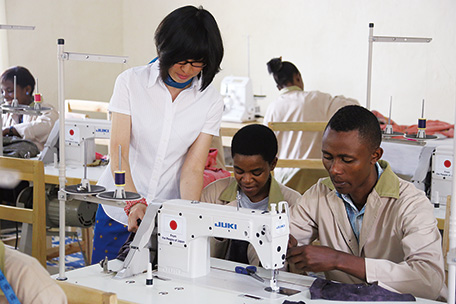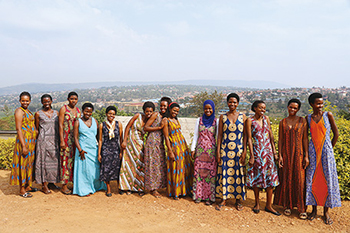Stories from the field 02
Strictly Cultivating the Mindset and Skills Needed for Independence
– Dressmaking Training for Women and Youth in Rwanda

Ms. Yamahira (left) checks the work of trainees in front of an electric sewing machine for industrial use. There are several men among the trainees. (Photo: Yasuko Yamahira)
Rwanda is located in the central part of the African Continent and was the site of a genocide that claimed the lives of some 1 million people in 1994. Although it has recovered as a result of the aid provided by various countries, Rwanda’s poverty rate still stands at 44.9%.
Nearly 90% of the population works in agriculture, forestry, or fisheries, and the poverty rate by occupation is highest in agriculture. The Government of Rwanda is currently working to provide people with training and access to jobs outside the agricultural sector in order to reduce the poverty rate.
However, women in particular lack access to educational opportunities and are placed in a very difficult position in terms of gaining economic stability. With many households losing the male breadwinner to the genocide, today 27.7% of the heads of households in Rwanda are women, and nearly 60% of these households live in poverty. These women must be given learning opportunities to acquire the skills needed to find employment and earn income.
Reborn Kyoto, an NPO that has provided support for women in developing countries to gain independence through dressmaking for over four decades, initiated a Grant Assistance for Japanese NGO Project1 called “Life Empowerment Project Through Acquiring High Level Clothes Fabrication Skills” in Rwanda’s capital of Kigali in July 2013. The project aims to pave the way for economic independence among youth, particularly women, by providing them with training to acquire high level dressmaking skills using industrial electric sewing machines, thereby opening up opportunities for employment and income.
Ms. Yasuko Yamahira, Project Director, found difficulties with student tardiness initially after she was dispatched to the country. Being late is a common occurrence in Rwanda where timeliness is not a major concern. When students were asked why, everyone answered the same, “I was helping a woman in the neighborhood give birth.” Instead of allowing this behavior, Ms. Yamahira decided to take a tougher stance. Students are given 1,000 Rwandan francs (approximately 170 yen) for each day they attended to cover their transportation costs, but Ms. Yamahira announced that anyone who was late would not receive this allowance. In addition, classes were separated into groups of five and if one of the group’s members was late, then the entire group had to clean the school’s restroom.
“Some of the students walked three hours one way in order to use the transportation allowance for daily expenses, so many were quite upset when I said that this would not be paid if they were late. Nevertheless, tardiness declined immediately throughout the school. The idea of making the group clean the restroom also worked well. More than 70% of the students lost family members in the genocide and face a difficult life. However, if the party providing aid to these people only does so out of pity, this will not change local dependence on this aid. I believe a tougher stance is needed to foster independence.”

Trainees wear long dresses they made themselves using the traditional Rwandan fabric kitenge. (Photo: Yasuko Yamahira)
During their training, students first learned about the basics of dressmaking and then worked on fabricating shirts, slacks, dresses and tailored jackets using industrial electric sewing machines. These garments were made from kimonos of pure silk donated to Reborn Kyoto from people across Japan. Sewing with soft kimono fabric is very difficult, so once the students became proficient enough to do so it meant they could handle just about any fabric. In the first and second years, students continually practiced cutting and sewing using patterns made by Reborn Kyoto. Students who until then had never touched an industrial electric sewing machine were given a boost of self-confidence when they were able to sew clothing, which heightened their motivation as well.
After the first year, the project hired eight talented students to be assistants for the second year. These female students were hired solely based on their dressmaking ability and were very appreciative of the decision made by Reborn Kyoto and Ms. Yamahira because in Rwandan society emphasis is normally placed on one’s educational background instead. The hiring of these eight assistants helped augment the training structure and the next year all 60 trainees were successfully hired to work in sewing factories that had been set up in Rwanda by major foreign companies.
Nevertheless, Ms. Yamahira did not view the end goal of this project as supplying a labor force to factories. She says, “While working at a factory may provide stable income, factory workers repeat the same work over and over again each day. Once a student can create clothing patterns, they can receive orders for clothes on their own, which further expands their possibilities for employment. Working in earnest to acquire these skills can really change a person’s life. I want to convey the idea that there is joy in living and working.”
Having entered its third year, the project has now begun teaching the students pattern making, which involves accurate measurements and complex calculations. However, many of the students are not proficient at arithmetic because they are too poor to attend school. Ms. Yamahira and a dressmaking professional she works with decided to create groups consisting of students good at mathematics and those good at sewing, based on a careful evaluation of each individual student. Students are now training to acquire the skills needed for pattern making while also learning from one another.
*1 See the note for a description of Grant Assistance for Japanese NGO Projects.
<< Previous Page Next Page >>
Main Text | Statistics and Reference Materials | Stories from the field | Master Techniques, From Japan to the World | ODA Topics
